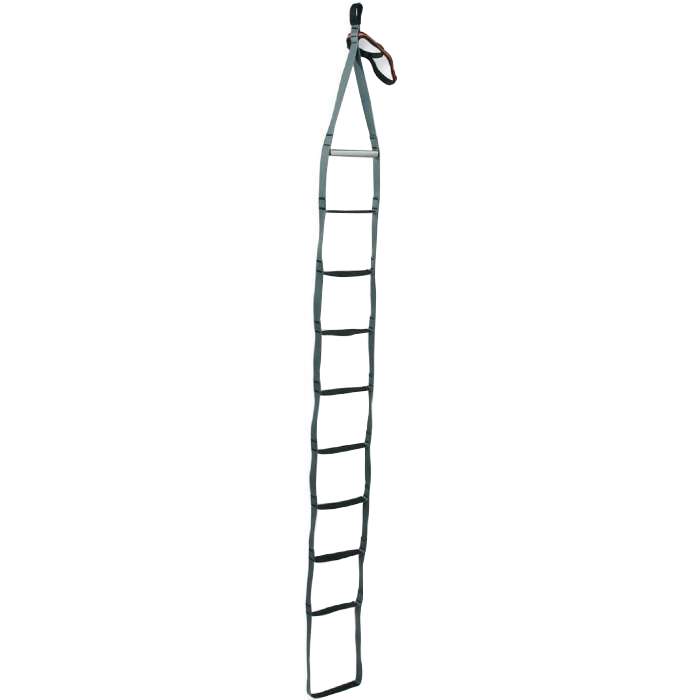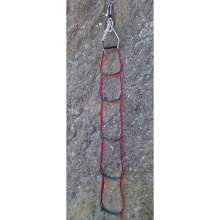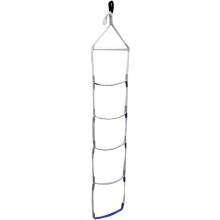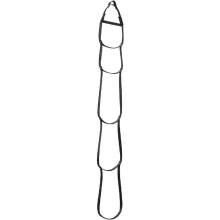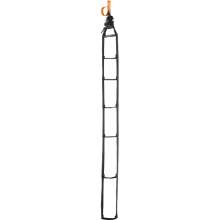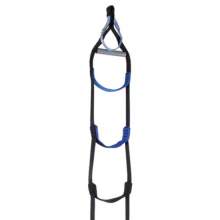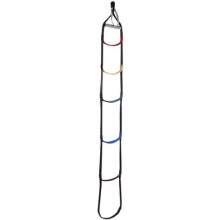Ladder Aider
Description
Veteran wall climbers know that the old-style alternating-step aiders tend to twist and tangle in the wind. Ladder Aiders eliminate this nuisance and are easier to use with big boots. A full 6-feet long, these are taller than many aiders for maximum efficiency.
Retail price
This Product is Hard to Find.
We don’t know where you can buy this item online in the US. We’ll continue to check all the major retailers and will update this page as soon as we find one.
If you know where to find this online in the US, let us know, and we’ll add the link.
| Weight (g) | 318 g |
Aider Type  Aider Type
LaddersLadder aiders have parallel sides with steps between them. They tend to have wider steps and are generally made of bulkier, more robust materials so they also are usually on the heavier side of aiders. EtriersEtrier aiders have steps made of loops that hang from a central strand of webbing. The steps are often triangular or teardrop shaped and may be on the same side or alternate from left to right. They tend to be cheaper than ladders and are usually lighter and easier to pack. Foot LoopsFoot loop aiders are typically made of a single strand of webbing or cord with a triangular step at the bottom. They are very light and compact and work best in a frogging setup for climbing a fixed rope. There is usually a buckle for adjusting the length of the aider and a strap for tightening the foot loop onto the foot. Russian AidersRussian aiders are a very different type of aider in that they are made of two parts. A set of stirrups attach to each lower leg which have metal hooks that are fixed on the side of the leg below the knee. The second part consists of a piece or pieces of webbing with metal rings sewn at different heights. These strands of webbing are clipped to the protection or ascender much like other aiders, but rather than having steps to walk up, the climber alternates hooking progressively higher into the rings using the metal hook now attached to their leg. |
Ladder |
Full Steps  Full StepsA full step on an aider is made to accommodate long-term standing in by the full foot. Full steps also tend to have extra stitching reinforcement to help keep them open and more comfortable for extended standing. These are not to be confused with smaller steps sewn into or above the upper steps of a ladder to allow temporarily higher top-stepping; WeighMyRack refers to these as Half Steps. |
9 |
Half steps  Half StepsHalf steps are smaller than full steps and are sewn inside, between, or above the full steps of an aider. These steps are usually an accessory step designed to slightly extend the reach of the step directly below them; they tend to not be as wide, reinforced or comfortable to stand in for long periods of time and aren’t usually counted by the manufacturer. WeighMyRack considers anything that is less than half the height or width of the average step on the aider to be a Half Step. |
0 |
Hero Loop  Hero LoopsA hero loop is a small loop of webbing that is sewn either into or through the upper clip-in point of an aider. Hero loops are usually reinforced with extra stitching and provide a robust handle while climbing an aider. They are often used as a hook-in point for a fifi hook while standing high or performing a top step move in an aider. |
2 loops |
Spreader Bar  Spreader BarA spreader bar is a stiff, robust bar typically made of plastic that is attached below the clip-in point of a ladder style aider. This bar keeps the sides of the ladder from collapsing against the sides of the foot when the ladder is weighted. Spreaders make ladders more comfortable to stand in for extended periods of time. |
Yes, has a reinforced plastic bar above the top step |
Double Bottom Step  Double Bottom StepsDouble bottom steps are either an extra step sewn next to the bottom step on an etrier or an extra wide step at the bottom of a ladder. This extra space at the bottom of an aider is helpful for switching feet before climbing the aider or when stepping into and out of the ladder when performing free climbing moves. An advantage of standing with both feet together is it takes less balance and energy than when your feet are apart. This can offer a rest for your hips when you’re hanging in a harness for hours. |
No, bottom step is designed for 1 foot |
Integrated Storage  Integrated StorageIntegrated storage in an aider is usually accomplished by incorporating a small bag or stuff sack for smaller etriers and alpine aiders but can also include a sewn-in loop of elastic or an adjustable velcro strap. This storage also helps in racking aiders out of the way when switching to free climbing in the middle of an aid route. |
No included storage system |
Lower Clip-in Loop  Lower Clip-in LoopThis sewn reinforced loop on the bottom step of an aider is designed to have an extra aider clipped to it. This feature is handy for down-climbing when back cleaning gear, as it allows the length of the ladder to be doubled and simultaneously connected to a single piece. This feature can also be used to hang weight like unused gear from the ladder to help stabilize it in windy conditions. |
No included clip-in loop |
Foot Retaining Strap  Foot Retaining StrapA foot retaining strap is typically on the bottom step of an aider. They are designed to keep the step fixed to the foot, usually when the ladder is being used to jug a fixed line using an ascender. They can be particularly useful in high wind conditions in overhanging terrain where the step may be blown away from the foot more easily. These straps are most commonly seen on single-step foot loops and are made of an elastic loop or an adjustable nylon strap. |
No retaining foot strap |
| Availability | Sold as single |
| Material | Nylon with aluminum spreader bar |
| Strength | |
| Color | Gray |
No reviews yet.
If you know of a good product video that should be here, let us know, and we'll put it up.
If you're looking for gear videos in general, check out our Vimeo and YouTube channels to see the newest gear.

